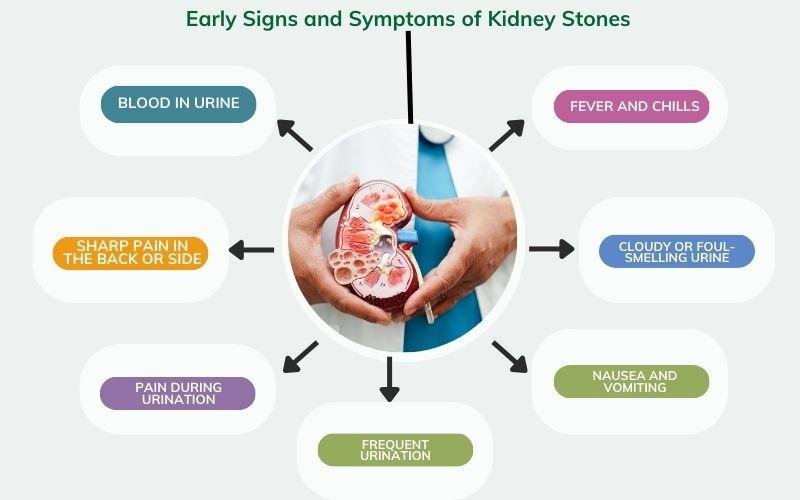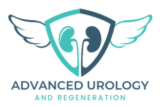Introduction
Kidney stones, a prevalent urological issue, can lead to considerable discomfort and health complications if left untreated. Recognizing the early signs of kidney stones is crucial for timely intervention and effective stone disorders treatment. Dr. Bivek Kumar, renowned as the best urologist in Kolkata, offers expert care and comprehensive treatment for stone disorders at his clinic. Here, we will delve into the initial symptoms of kidney stones and underscore the importance of consulting a professional urologist like Dr. Bivek Kumar for prompt medical attention and personalized care.
Understanding Kidney Stones
Kidney stones, or renal calculi, are hard deposits formed from minerals and salts that crystallize in the kidneys. They can vary in size, from tiny grains to larger, more problematic stones. The stones can travel through the urinary tract, causing varying degrees of pain and discomfort.
Early Signs and Symptoms of Kidney Stones

Recognizing the early signs of kidney stones can facilitate prompt medical intervention and reduce the risk of complications. The initial symptoms include:
Sharp Pain in the Back or Side: Sudden, severe pain in the back or side, typically below the ribs, is one of the first signs of a kidney stone. This pain may extend to the lower abdomen and groin area.
Pain During Urination: Experiencing pain or a burning sensation while urinating can indicate the presence of kidney stones. This symptom occurs when the stone moves into the ureter, causing irritation and obstruction.
Frequent Urination: An increased urge to urinate, even if the output is small, is a common symptom. This occurs due to the stone’s movement and its impact on the urinary tract.
Blood in Urine: Hematuria, or the presence of blood in the urine, is a distinct indicator of kidney stones. The urine may appear pink, red, or brown due to the stone causing damage to the urinary tract lining.
Nausea and Vomiting: The intense pain associated with kidney stones can lead to nausea and vomiting. These symptoms often accompany severe discomfort and require medical attention.
Cloudy or Foul-Smelling Urine: Kidney stones can cause changes in urine appearance and odor. Cloudy or foul-smelling urine may suggest an infection or the presence of kidney stones.
When to Seek Medical Help
If you experience any of the above symptoms, it’s essential to consult a urologist like Dr. Bivek Kumar for an accurate diagnosis and effective stone disorder treatment. Delaying medical care can lead to complications, such as urinary tract infections, kidney damage, or persistent pain.
Diagnosis and Treatment Options
At Advanced Urology and Regeneration, Dr. Bivek Kumar employs state-of-the-art diagnostic techniques to identify kidney stones accurately. These include:
- Imaging Tests: Ultrasound, CT scans, and X-rays to locate the stones and assess their size.
- Urine Tests: To detect crystals, blood, or infection in the urine.
- Blood Tests: To check for high levels of minerals that can cause stones.
Once diagnosed, the treatment plan may include:
- Medications: Pain relievers, alpha-blockers to relax the ureter muscles, and medications to prevent stone formation.
- Extracorporeal Shock Wave Lithotripsy (ESWL): A non-invasive procedure that employs shock waves to fragment stones into smaller, passable pieces.
- Ureteroscopy: A minimally invasive procedure to remove or break up stones using a small scope passed through the urethra and bladder.
- Percutaneous Nephrolithotomy: A surgical procedure for larger stones that cannot be treated with less invasive methods.
Preventing Kidney Stones
Preventing kidney stones involves lifestyle changes and dietary adjustments, such as:
- Staying Hydrated: Drinking plenty of fluids to dilute the substances that form stones.
- Dietary Changes: Cutting back on foods high in salt, protein, and oxalates
Medications: In some cases, medications may be prescribed to control the levels of minerals and salts in the urine.
Actionable Tips for Patients

- Increase Fluid Intake: Aim to drink at least 2-3 liters of water daily to flush out toxins and prevent stone formation.
- Monitor Diet: Limit intake of high-oxalate foods such as spinach, nuts, and chocolate. Incorporate more fruits and vegetables that are low in oxalates.
- Stay Active: Regular physical activity helps maintain a healthy weight and reduces the risk of kidney stones.
About Dr. Bivek Kumar
Conclusion
Recognizing the first signs of kidney stones and seeking prompt medical attention from a qualified urologist like Dr. Bivek Kumar can prevent complications and ensure effective stone disorder treatment. If you experience any symptoms of kidney stones, don’t hesitate to contact Dr. Kumar at Advanced Urology and Regeneration for expert care and comprehensive stone disorder treatment.
For more information, visit Advanced Urology and Regeneration.
FAQs
The best treatment depends on factors like stone size and location. Options include shock wave therapy, ureteroscopy, and surgery for larger stones.
Yes, many people can manage small stones with proper hydration and pain management. Severe symptoms or larger stones may require medical intervention.
Options include natural passage with hydration, medical procedures like shock wave therapy or ureteroscopy, and surgery for complex cases.
